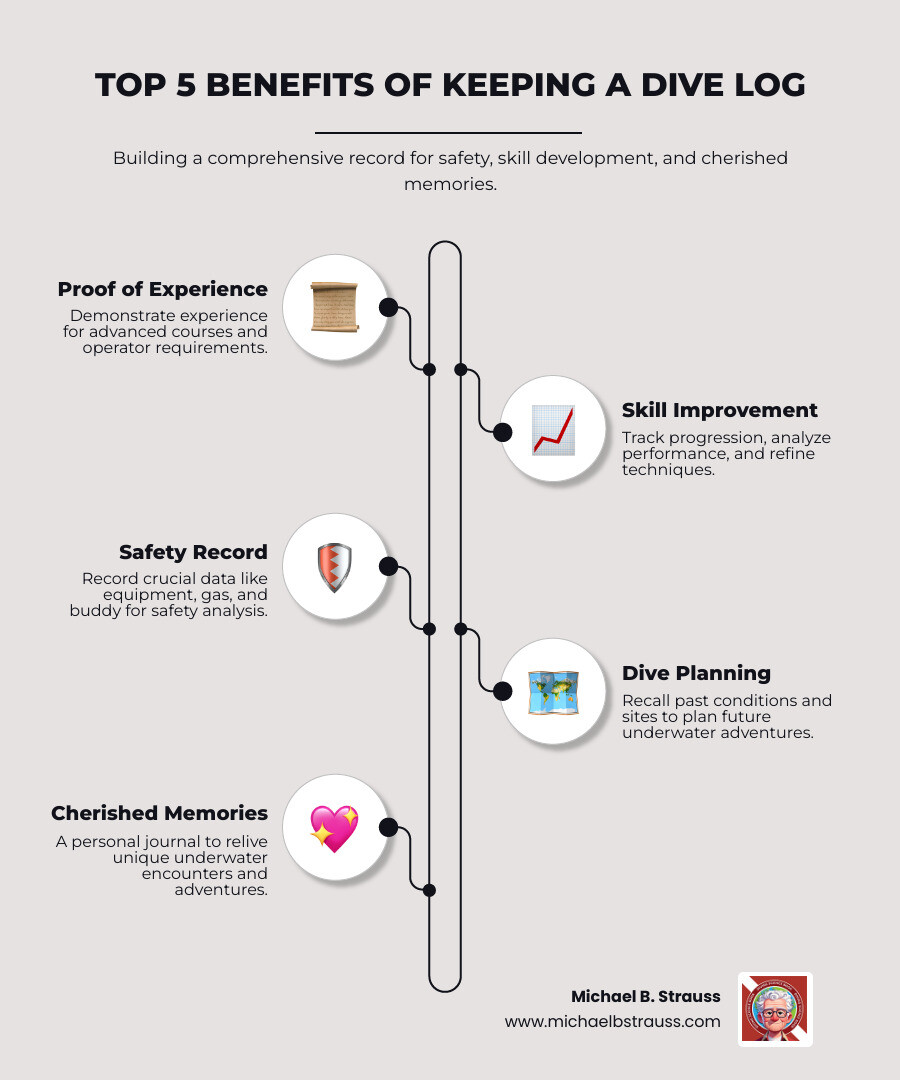The Essential Role of a Dive Log in Your Scuba Journey
Dive log books are essential tools for scuba divers to record details about their underwater adventures. From Open Water certification to advanced explorations, these records serve critical purposes throughout a diver's journey.
What dive log books contain:
- Basic dive information - dive number, date, location, and dive site name
- Technical data - maximum depth, bottom time, water temperature, and visibility
- Equipment details - gas mix used, tank pressures, and weight configuration
- Safety records - buddy information and instructor verification signatures
- Personal notes - marine life sightings and memorable dive experiences
A dive log serves as both a memory book and a professional requirement. As one experienced diver noted, "It is fun, a great way to keep track of your previous dives and it provides useful information you might need for your dive adventures to come!"
Why divers need log books:
Logging is a core habit taught during Open Water certification. These records prove dive experience for advanced courses, help dive operators assess skill levels, and serve as a reference for planning future dives. Many dive shops or liveaboards require proof of recent activity, sometimes requesting a refresher course if you haven't logged a dive within six months. While the level of detail is personal, from basic safety data to detailed narratives, the habit itself is invaluable.

While logging can feel like a chore at first, it quickly becomes a profound practice. It's more than a requirement; it's a comprehensive record of your underwater journey that improves safety, skill, and memories. For new divers, a dive log book is essential proof of experience for advanced courses like Deep Diver or Wreck Diver.
Beyond certifications, logs become personal memory books, allowing you to revisit sites with a richer understanding of their features and marine life. They are also vital data collection tools, offering objective insights into your performance to help you become a safer, more efficient diver. This data is especially valuable when paired with a scientific understanding of diving physiology. To deepen your appreciation for this, explore our resources on Diving Science.
The benefits of maintaining a log—from verifying experience for a trip to recalling a special moment—far outweigh the effort, making it a cornerstone of the diving life.
Physical and Digital Dive Log Books: Tools for Every Diver

The world of dive log books has transformed dramatically. Today's divers can choose between the classic charm of paper logbooks and the sleek efficiency of digital apps. Both options have their devoted followers, and understanding what makes each special can help you find the perfect match.
What to Record: The Anatomy of a Perfect Dive Log Entry
Creating a meaningful dive log book entry tells the complete story of your dive. While some divers prefer simple notes and others write detailed narratives, certain key elements make every entry valuable.
- Dive number tracks your personal count of adventures, while the date is crucial, as trips can blur together.
- The location and dive site name pinpoint where you were, from the country to the specific reef or wreck.
- Buddy information, including contact details, helps build a network of future dive partners.
- Technical details like maximum/average depth, bottom time, and water temperature are key safety records, often captured by dive computers. Visibility is a subjective but useful note (e.g., poor to excellent).
- Your gas mix (air, nitrox, etc.) is crucial for safety analysis, especially in advanced diving. Tank pressures (start/end) help track gas consumption for better planning.
- Weight used is vital for fine-tuning buoyancy, as it's affected by your suit, tank type, and water salinity.
- Equipment notes help you track gear performance and remember successful configurations. Note service dates to keep everything maintained.
- Marine life sightings and narrative comments are where you can document encounters, highlights, and challenges that make each dive unique.
- A verification stamp or signature from a dive professional or buddy is still a standard way to prove experience.
For comprehensive guidance on capturing all the right information, check out The Beginner's Guide to Using Dive Logs.
Choosing Your Dive Log Book: Paper or Digital?
The choice between physical and digital dive log books often comes down to personal preference. Many experienced divers maintain active logs regardless of their chosen format, and some even use both.
Physical dive log books offer a tangible, battery-free experience. The ritual of writing by hand, collecting stamps, and flipping through pages can be very satisfying. However, they are vulnerable to water damage, can be bulky, and often have limited space.
Digital dive log books and apps offer incredible convenience. Dive computers can sync data automatically, and your entire dive history is searchable, analyzable, and backed up to the cloud. Popular options include dedicated diving apps, like those recommended by major diving organizations, and simple spreadsheets. The downsides include reliance on batteries and devices, and some divers prefer to disconnect from screens post-dive.
Many divers find success with a hybrid approach, using paper logs during trips and transferring data to digital formats later.
| Criteria | Physical Dive Log Books | Digital Dive Log Books |
|---|---|---|
| Durability | Can be waterproof, but susceptible to wear | Resistant to physical damage, but depends on device |
| Convenience | Easy to use on-site, no batteries required | Quick data entry, searchable, accessible anywhere |
| Data Backup | Physical copy only, risk of loss | Cloud backup, easy duplication |
| Verification/Signatures | Easy for instructors to sign/stamp | Digital signatures, photo attachments |
| Cost | One-time purchase | May require app or device, some free options |
The Practical Importance of Keeping Dive Log Books
Beyond memories, dive log books serve crucial practical purposes that impact your safety and opportunities. They are active tools that help you grow as a diver.
Proof of experience is the most immediate need. Advanced courses, challenging dive sites, and liveaboards often require a specific number of logged dives. While not always checked, having your logbook can prevent you from missing out on a dive.
Your dive log books are invaluable for tracking skill progression. By analyzing your weight usage, gas consumption, and other data, you can fine-tune your buoyancy and improve dive planning.
The safety benefits extend even further. Recording equipment performance, conditions, and any incidents creates a valuable safety reference. In a medical emergency, a detailed log can provide crucial information to healthcare providers.
For deeper understanding of the physiological aspects that make logging so important, explore our resources on Decompression Science and Why and at What Sites Decompression Sickness Can Occur.
Creative Logging & Protecting Your Records
Make your dive log books a personal treasure. Collect unique dive shop stamps, sketch marine life, and journal memorable moments. Recording buddy contact info helps you build a global network of dive friends.
Protecting your records is vital. For physical logs, consider waterproof books made from synthetic paper. For digital logs, ensure cloud backup is enabled to prevent data loss from device failure or loss.
Whether you choose a physical or digital format, creative logging and robust protection ensure your dive log books remain treasured companions, much like the incredible adaptations we see in Mammalian Divers.
Elevating Your Diving Through Diligent Logging
What begins as a certification requirement often becomes a meaningful habit of continuous improvement through record-keeping. Each entry in your dive log book, from a simple depth reading to a detailed narrative, is a building block in your diving education.
Reviewing past entries reveals patterns in your performance, such as how water temperature affects your air consumption or how your weight needs change in saltwater. These personal insights are invaluable for adapting your diving style.
Building a lifelong habit for safety and growth happens gradually. The simple act of recording each dive fosters a habit of reflection, making you a more thoughtful and deliberate diver. This discipline naturally extends to better dive planning, equipment choices, and safety protocols.
Analyzing your own data for personal progress shows your evolution from a nervous beginner to a confident explorer. This personal database allows you to track improvements in buoyancy control and air consumption while celebrating the incredible places you've been and the marine life you've seen.
Connecting your logged data to diving science makes the principles more tangible. Gaining insights from Dr. Michael B. Strauss and the diving community is more effective when you can reference your own dive profiles. Your log also becomes a great conversation starter, creating connections and learning opportunities with fellow divers.
Maintaining a dive log book is one of the most valuable habits a diver can cultivate, regardless of experience. These records don't just document where you've been—they guide where you're going. To connect your personal dive data with the underlying principles, get your copy of Diving Science Revisited today. Diligent logging combined with solid scientific knowledge is the foundation for a lifetime of safe, enjoyable diving.
DISCLAIMER: Articles are for "EDUCATIONAL PURPOSES ONLY", not to be considered advice or recommendations.






